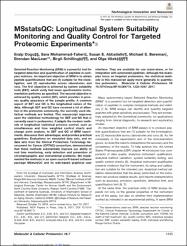MSstatsQC: Longitudinal System Suitability Monitoring and Quality Control for Targeted Proteomic Experiments

Göster/
Tarih
2017Yazar
Doğu, EralpMohammad-Taheri, Sara
Abbatiello, Susan E.
Bereman, Michael S.
MacLean, Brendan
Schilling, Birgit
Vitek, Olga
Üst veri
Tüm öğe kaydını gösterÖzet
Selected Reaction Monitoring (SRM) is a powerful tool for targeted detection and quantification of peptides in complex matrices. An important objective of SRM is to obtain peptide quantifications that are (1) suitable for the investigation, and (2) reproducible across laboratories and runs. The first objective is achieved by system suitability tests (SST), which verify that mass spectrometric instrumentation performs as specified. The second objective is achieved by quality control (QC), which provides in-process quality assurance of the sample profile. A common aspect of SST and QC is the longitudinal nature of the data. Although SST and QC have received a lot of attention in the proteomic community, the currently used statistical methods are limited. This manuscript improves upon the statistical methodology for SST and QC that is currently used in proteomics. It adapts the modern methods of longitudinal statistical process control, such as simultaneous and time weighted control charts and change point analysis, to SST and QC of SRM experiments, discusses their advantages, and provides practical guidelines. Evaluations on simulated data sets, and on data sets from the Clinical Proteomics Technology Assessment for Cancer (CPTAC) consortium, demonstrated that these methods substantially improve our ability of real time monitoring, early detection and prevention of chromatographic and instrumental problems. We implemented the methods in an open-source R-based software package MSstatsQC and its web-based graphical user interface. They are available for use stand-alone, or for integration with automated pipelines. Although the examples focus on targeted proteomics, the statistical methods in this manuscript apply more generally to quantitative proteomics.

















